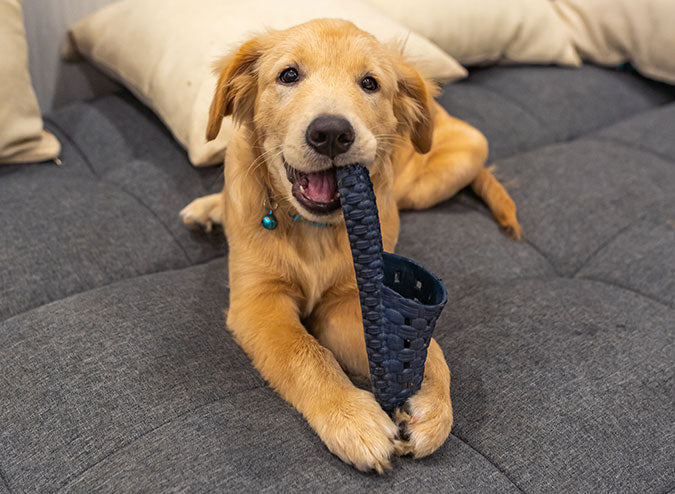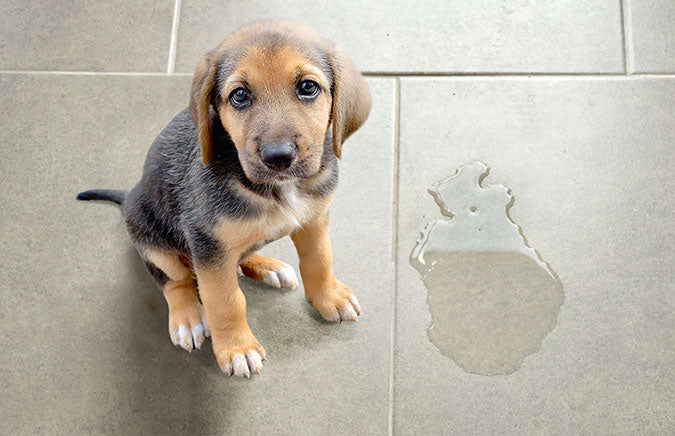Puppy Behaviors To Watch Out For

We all love our puppies, and want to do everything we can to make sure they grow up into happy, well-adjusted dogs. But sometimes, their behavior can be a little bit… unexpected. In this blog post, we'll list six of the most common puppy behaviors that you'll want to discourage as early as possible. As innocent as they may seem, each has the potential to grow into a major problem later on if left unchecked. Read on and learn how to nip these bad habits in the bud.
1. Chewing on Furniture & Other Objects
Chewing is a natural behavior for all dogs, especially for puppies who may be teething. But excessive chewing and chewing items they shouldn't chew on can become a problem if left unaddressed. It's important to get to the root of the chewing. Is it boredom? Anxiety? Excess energy? If your puppy is chewing excessively and you can't quite pinpoint why, consult with your veterinarian to rule out any medical issues.

If the chewing is due to boredom, try increasing the puppy's exercise and providing more mentally stimulating toys. If the puppy is anxious or stressed, talk to your veterinarian about possible solutions such as dog trainers or if necessary, dog appeasing pheromones. Excessive chewing can be a nuisance behavior, but with some patience and understanding, it can be resolved.
2. Excessive Jumping
Like most behaviors that are included on this list, jumping up is a natural behavior for dogs, but should not be left unchecked. Puppies will often jump up to greet their mothers, and later their human owners, out of excitement. If no boundaries are set, your dog may develop the habit of jumping on strangers, which can be annoying and dangerous. For puppy parents, it's important to nip this behavior in the bud by teaching your puppy that jumping is only acceptable in specific situations, such as when you invite them to do so.
Since jumping is usually an attention-seeking behavior, correcting the behavior can be as simple as turning away or ignoring your puppy when they jump on you (as difficult as it can be to resist those eyes). Avoid touching, speaking to, or making eye contact when your puppy is exhibiting this behavior.
If your puppy continues to jump up excessively, you may need to seek professional help to correct the behavior. Excessive jumping can be a sign of excitement or anxiety, and a trained behaviorist will be able to help you identify the root cause of the problem and provide solutions.
3. Extreme Separation Anxiety
It's common for puppies to feel anxious when they're away from their owner, especially during the first few weeks. But it's important for pups for learn how to cope when they're alone, or else you risk complicated, stressful goodbyes whenever you need to leave the house. Crate training from an early age can help.
Dogs are den animals, and a crate provides them with a safe place to retreat to when they're feeling anxious. Getting your puppy used to spending time in a crate will make it easier for them to deal with being away from you. Start by keeping the crate in your puppy's sleeping area, and put their favorite toy or blanket inside. Encourage them to go into the crate on their own, and praise them when they do. Once your puppy is comfortable going into the crate on their own, you can start leaving them alone for short periods at a time. Gradually increase the amount of time you're gone, and soon your puppy will be able to stay in the crate for hours at a time without feeling anxious.
4. Signs of Aggression
Puppies are notoriously playful creatures, and it's not uncommon for them to engage in biting or nipping as part of their play. However, it's important to keep an eye out for any aggressive behavior from your puppy, as letting this go unchecked can have dangerous consequences.
Puppyhood is an important time for socialization. Puppies who are exposed to a wide variety of people, animals, and situations during this time period are less likely to be fearful and aggressive as adults. If your puppy is regularly growling at other people or animals, you may need to seek professional socialization help. You can also discourage aggressive behaviors by avoiding play that involve biting or nipping. With a little training and supervision, you can help your puppy grow into a well-adjusted adult dog.
5. Peeing & Pooping Inside the House

If you've been potty training your puppy and they're still having accidents indoors, it may be time to seek help. Continuous accidents after you've been working with them for a while is usually a sign that something isn't working, and you need to try another method. One option is crate training, which can be effective for some puppies. But if that doesn't work or you're not comfortable with it, you may need to consult a professional trainer or behaviorist. They will be able to assess the situation and give you specific advice on how to move forward. In most cases, with a little help, you'll be able to get your puppy potty trained successfully.
6. Barking Excessively
Dogs bark for a variety of reasons, but excessive barking can quickly become a nuisance for both you and your neighbors. If your puppy is barking excessively, you'll need to nip that in the bud before it becomes a problem or neighborhood complaint. The first step is to figure out why your puppy is barking. Is he bored? Frustrated? Scared? Once you know the reason for the barking, you can begin to address the problem.
If your puppy is barking out of boredom, for example, try giving him more attention and exercise. If he's barking out of frustration, try to provide more opportunities for him to vocalize, such as with a toy that makes noise. If he's barking out of fear, try to desensitize him to whatever is causing the fear. With a little patience and training, you can help your puppy learn when it's appropriate to bark and when it's not.
Conclusion
Addressing these behaviors early on can help your dog develop good habits that will last a lifetime. Thankfully, Petmate has plenty of products to help you get started. Shop our selection of puppy essentials, including crates, puppy chew toys, and more today. When it comes to raising a well-behaved pup, don't wait – start today!







